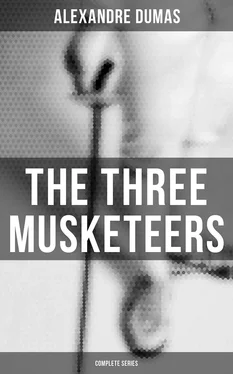He had scarcely finished, when d’Artagnan made such a furious lunge at him that if he had not sprung nimbly backward, it is probable he would have jested for the last time. The stranger, then perceiving that the matter went beyond raillery, drew his sword, saluted his adversary, and seriously placed himself on guard. But at the same moment, his two auditors, accompanied by the host, fell upon d’Artagnan with sticks, shovels and tongs. This caused so rapid and complete a diversion from the attack that d’Artagnan’s adversary, while the latter turned round to face this shower of blows, sheathed his sword with the same precision, and instead of an actor, which he had nearly been, became a spectator of the fight—a part in which he acquitted himself with his usual impassiveness, muttering, nevertheless, “A plague upon these Gascons! Replace him on his orange horse, and let him begone!”
“Not before I have killed you, poltroon!” cried d’Artagnan, making the best face possible, and never retreating one step before his three assailants, who continued to shower blows upon him.
“Another gasconade!” murmured the gentleman. “By my honor, these Gascons are incorrigible! Keep up the dance, then, since he will have it so. When he is tired, he will perhaps tell us that he has had enough of it.”
But the stranger knew not the headstrong personage he had to do with; d’Artagnan was not the man ever to cry for quarter. The fight was therefore prolonged for some seconds; but at length d’Artagnan dropped his sword, which was broken in two pieces by the blow of a stick. Another blow full upon his forehead at the same moment brought him to the ground, covered with blood and almost fainting.
It was at this moment that people came flocking to the scene of action from all sides. The host, fearful of consequences, with the help of his servants carried the wounded man into the kitchen, where some trifling attentions were bestowed upon him.
As to the gentleman, he resumed his place at the window, and surveyed the crowd with a certain impatience, evidently annoyed by their remaining undispersed.
“Well, how is it with this madman?” exclaimed he, turning round as the noise of the door announced the entrance of the host, who came in to inquire if he was unhurt.
“Your excellency is safe and sound?” asked the host.
“Oh, yes! Perfectly safe and sound, my good host; and I wish to know what has become of our young man.”
“He is better,” said the host, “he fainted quite away.”
“Indeed!” said the gentleman.
“But before he fainted, he collected all his strength to challenge you, and to defy you while challenging you.”
“Why, this fellow must be the devil in person!” cried the stranger.
“Oh, no, your Excellency, he is not the devil,” replied the host, with a grin of contempt; “for during his fainting we rummaged his valise and found nothing but a clean shirt and eleven crowns—which however, did not prevent his saying, as he was fainting, that if such a thing had happened in Paris, you should have cause to repent of it at a later period.”
“Then,” said the stranger coolly, “he must be some prince in disguise.”
“I have told you this, good sir,” resumed the host, “in order that you may be on your guard.”
“Did he name no one in his passion?”
“Yes; he struck his pocket and said, ‘We shall see what Monsieur de Treville will think of this insult offered to his protege.’”
“Monsieur de Treville?” said the stranger, becoming attentive, “he put his hand upon his pocket while pronouncing the name of Monsieur de Treville? Now, my dear host, while your young man was insensible, you did not fail, I am quite sure, to ascertain what that pocket contained. What was there in it?”
“A letter addressed to Monsieur de Treville, captain of the Musketeers.”
“Indeed!”
“Exactly as I have the honor to tell your Excellency.”
The host, who was not endowed with great perspicacity, did not observe the expression which his words had given to the physiognomy of the stranger. The latter rose from the front of the window, upon the sill of which he had leaned with his elbow, and knitted his brow like a man disquieted.
“The devil!” murmured he, between his teeth. “Can Treville have set this Gascon upon me? He is very young; but a sword thrust is a sword thrust, whatever be the age of him who gives it, and a youth is less to be suspected than an older man,” and the stranger fell into a reverie which lasted some minutes. “A weak obstacle is sometimes sufficient to overthrow a great design.
“Host,” said he, “could you not contrive to get rid of this frantic boy for me? In conscience, I cannot kill him; and yet,” added he, with a coldly menacing expression, “he annoys me. Where is he?”
“In my wife’s chamber, on the first flight, where they are dressing his wounds.”
“His things and his bag are with him? Has he taken off his doublet?”
“On the contrary, everything is in the kitchen. But if he annoys you, this young fool—”
“To be sure he does. He causes a disturbance in your hostelry, which respectable people cannot put up with. Go; make out my bill and notify my servant.”
“What, monsieur, will you leave us so soon?”
“You know that very well, as I gave my order to saddle my horse. Have they not obeyed me?”
“It is done; as your Excellency may have observed, your horse is in the great gateway, ready saddled for your departure.”
“That is well; do as I have directed you, then.”
“What the devil!” said the host to himself. “Can he be afraid of this boy?” But an imperious glance from the stranger stopped him short; he bowed humbly and retired.
“It is not necessary for Milady to be seen by this fellow,” continued the stranger. “She will soon pass; she is already late. I had better get on horseback, and go and meet her. I should like, however, to know what this letter addressed to Treville contains.”
And the stranger, muttering to himself, directed his steps toward the kitchen.
In the meantime, the host, who entertained no doubt that it was the presence of the young man that drove the stranger from his hostelry, re-ascended to his wife’s chamber, and found d’Artagnan just recovering his senses. Giving him to understand that the police would deal with him pretty severely for having sought a quarrel with a great lord—for the opinion of the host the stranger could be nothing less than a great lord—he insisted that notwithstanding his weakness d’Artagnan should get up and depart as quickly as possible. D’Artagnan, half stupefied, without his doublet, and with his head bound up in a linen cloth, arose then, and urged by the host, began to descend the stairs; but on arriving at the kitchen, the first thing he saw was his antagonist talking calmly at the step of a heavy carriage, drawn by two large Norman horses.
His interlocutor, whose head appeared through the carriage window, was a woman of from twenty to two-and-twenty years. We have already observed with what rapidity d’Artagnan seized the expression of a countenance. He perceived then, at a glance, that this woman was young and beautiful; and her style of beauty struck him more forcibly from its being totally different from that of the southern countries in which d’Artagnan had hitherto resided. She was pale and fair, with long curls falling in profusion over her shoulders, had large, blue, languishing eyes, rosy lips, and hands of alabaster. She was talking with great animation with the stranger.
“His Eminence, then, orders me—” said the lady.
“To return instantly to England, and to inform him as soon as the duke leaves London.”
“And as to my other instructions?” asked the fair traveler.
Читать дальше












